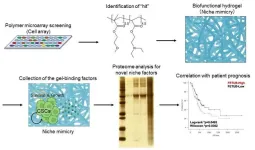(Press-News.org) New research: Fivefold increase in the melting of Greenland's glaciers over the last 20 years
In the largest survey of its kind ever conducted, using both satellite imagery and old aerial photos from the Danish National Archives, researchers from the University of Copenhagen firmly establish that Greenland’s glaciers are melting at an unprecedented pace. Melting has increased fivefold in the past 20 years. The study eliminates any lingering doubts about the impact of climate change on Greenland's more than 20,000 glaciers.
Based on the most comprehensive monitoring of Greenland’s glaciers to date, Danish researchers have been able to cast aside any doubt regarding the impact of climate change on the planet.
Their new results document that, compared to the 80s and 90s, when glaciers shrank by an average of about five meters a year, melting has increased fivefold during the past 20 years, so that today, 25 meters per year are lost.
The new study shows the response of Greenland’s glaciers to climate change over a 130-year period. The past two decades stand out in particular, as melting during this period increased even more dramatically.
The study has been published today in the scientific journal Nature Climate Change. [link] https://www.nature.com/articles/s41558-023-01855-6
A number of studies in recent years have shown that Greenland's largest glaciers are under massive pressure due to climatic changes and rising temperatures. However, doubts remained about the extent of the melting glaciers, of which there are approx. 22,000 in Greenland, partly due to inadequate measurement methods. But any doubts that may have existed before have now been dispelled by the Danish researchers.
"In this article, we make it clear that Greenland's glaciers are all melting, and that things have moved exceptionally fast over the past 20 years. There is no doubt about the extent anymore and actually no reason to investigate the claim further," says Assistant Professor Anders Bjørk from the Department of Geosciences and Natural Resource Management.
200,000 aerial photos from the Danish National Archives
According to the researcher, previous doubts were warranted to a certain extent. Indeed, the possibilities of investigating and documenting the extent to which glaciers melted away over extended periods of time were limited prior to the era of satellite imagery.
For example, only one of Greenland’s approximately 22,000 glaciers was continuously monitored using so-called mass balance measurements, which began in the mid-1990s. At the same time, there were areas of Greenland covered by glacier that seemed unaffected by rising temperatures just a few years back.
"Previously, we saw areas in northern Greenland, for example, that were lagging behind and melting less compared to the hardest hit glaciers. This generated a bit of doubt about how serious things were in these areas. At the same time, no one before us had ever shed light on such a long period of time, which precipitated doubts as well. But now, the picture is conclusive: The melting of all glaciers is in full swing, there is no longer any doubt," says Anders Bjørk.
To gain a full overview, the researchers closely studied 1,000 of Greenland's glaciers, a representative amount for the entire country. They tracked the melting of glaciers over the past 130 years using satellite images and 200,000 old aerial photos from the Danish National Archives, which had previously been used to make maps.
"Slightly more than 1,000 glaciers is an enormous number to study, but we did so because we simply wanted to be absolutely certain to get a comprehensive picture of developments over the last 130 years," says Anders Bjørk.
Sea level rise and lack of water
While Anders Bjørk says that there is no longer much reason to look into whether glaciers are melting or not, the development still needs to be closely monitored. Over the past twenty years, melting glaciers have contributed to about 21% of observed sea level rise.
"Of course, we’ll be keeping a close eye on developments. We’re in a new era where glaciers are generally in retreat, with major consequences for sea levels that will rise faster and faster," he says.
Paradoxically, the melting of glaciers in Greenland will lead to a lack of water. Glaciers will reach a point at which they become so small that meltwater rivers will be diminished or disappear altogether. Among other things, this means that Greenland’s ecosystems will change and that renewable energy will face unforeseen hurdles:
"Today, there is already a very real problem in Greenland that the sites where hydroelectric power plants were built 15-20 years ago, based upon the melt from smaller glaciers, do not get enough water because the ice is gone and not being formed again," says the researcher.
As a researcher and private person, what do you think about the extent of the melt that your study presents?
"I think it's quite disturbing. Because we’re well aware of where this is headed in the future. Temperatures will continue to rise and glaciers will melt faster than they do now," says Anders Bjørk, adding:
"But our study also shows that glaciers respond to climate change very quickly, which is in itself positive because it tells us that it’s not too late to minimise warming. Everything that we can do to reduce CO2 emissions now will result in slower sea level rise in the future."
About the study
In combination with satellite observations, the researchers used an untapped archive of aerial photos to document the development of more than 1,000 land-terminating glaciers in Greenland.
The researchers' observations cover all of Greenland's major regions over a 130-year period and, for the first time ever, make it possible to document the extent of glacial retreat during the 21’ century, throughout Greenland, within the 130-year time scale.
Over thirteen decades of observation, scientists have observed a significant and widespread retreat among Greenland's glaciers.
The pace at which glaciers have retreated over the past two decades has accelerated dramatically.
Furthermore, despite the wide range of climate zones and glacier characteristics across Greenland, scientists find that this latest acceleration in retreat is ubiquitous and includes Earth's northernmost glaciers.
Together, these findings indicate that the rate of retreat observed in the twenty-first century is exceptional for Greenland when viewed in a century-long context.
The study was conducted by a group of researchers from the University of Copenhagen and GEUS together with American colleagues.
The study has been published in the scientific journal Nature Climate Change.
Contact:
Anders Bjørk
Assistant Professor
Department of Geosciences and Natural Resource Management
University of Copenhagen
+45 29 92 17 42
Mail: aab@ign.ku.dk
Michael Skov Jensen
Journalist and team coordinator
The Faculty of Science
University of Copenhagen
Mobile: +45 93 56 58 97
msj@science.ku.dk
END
New research: Fivefold increase in the melting of Greenland's glaciers over the last 20 years
In the largest survey of its kind ever conducted researchers from the University of Copenhagen firmly establish that Greenland’s glaciers are melting at an unprecedented pace.
2023-11-09
ELSE PRESS RELEASES FROM THIS DATE:
Drug screen points toward novel diabetes treatments
2023-11-09
A drug currently in clinical trials as a cancer therapy can also stimulate pancreatic beta cells to secrete insulin, revealing a previously unknown mechanism for insulin regulation in type 2 diabetes, according to a new study by Weill Cornell Medicine investigators. The preclinical discovery, reported Nov. 9 in Nature Chemical Biology, provides a new chemical tool for probing the biology of diabetes, and could point the way toward better treatments for the disease.
“We have known about insulin for a century, but when it comes to the major mechanisms controlling insulin secretion, there ...
Team creates synthetic enzymes to unravel molecular mysteries
2023-11-09
A University of Texas at Dallas bioengineer has developed synthetic enzymes that can control the behavior of the signaling protein Vg1, which plays a key role in the development of muscle, bone and blood in vertebrate embryos.
The team of researchers is using a new approach, called the Synthetic Processing (SynPro) system, in zebrafish to study how Vg1 is formed. By learning the molecular rules of signal formation in a developing animal, researchers aim to engineer mechanisms — such as giving cells new instructions — that could play a role in treating or preventing disease.
Dr. P.C. Dave P. Dingal, assistant professor of bioengineering in the Erik Jonsson ...
Finding your niche: A synthetic cancer stem cell microenvironment
2023-11-09
Researchers from Tokyo Medical and Dental University (TMDU) report the construction of a synthetic polymer biomaterial that successfully recapitulates the pancreatic adenocarcinoma microenvironment and could be used to identify novel treatment targets
Tokyo, Japan – One of the biggest challenges in biomedical research is finding a way to capture the complexity of the human body in laboratory-based techniques, to enable them to be investigated accurately. Now, researchers from Japan report an approach for precisely imitating a key feature of aggressive cancers in the laboratory.
In a study published recently in Inflammation and Regeneration, researchers from Tokyo Medical and ...
Vigorous exercise, rigorous science: What scientists learned from firefighters in training
2023-11-09
The 11 young firefighters went through a rigorous training exercise, carrying up to 40 pounds of gear over hilly terrain during a 45-minute training exercise in the California sun. Gloves, helmets, flashlights, goggles, and more weighted them down as they sprinted through the countryside wearing fire-resistant clothing to show they were ready to serve as wildland firefighters.
When the training was over, they immediately went to the medical tent—not to rest and recover but to give samples of their blood, ...
Study reveals the structure of brain waves associated with memory consolidation
2023-11-09
The reactivation of patterns of neuronal activity based on experience is crucial for learning and memory, but these patterns and the associated brain waves vary widely and are difficult to classify. Such events, dubbed ripples, are characteristic of the hippocampus, a brain region responsible for memory. Until now, the most common way to study ripples was using frequency analysis, but a project led by the Spanish National Research Council (CSIC) has proposed a new classification strategy.
Using data science tools, a research group from the Instituto Cajal (IC-CSIC) headed by Liset M. de la Prida has managed to figure out the temporal structure of hippocampal ripples. The scientists ...
Reducing vitamin B5 slows breast cancer growth in mice
2023-11-09
Francis Crick Institute press release
Under strict embargo: 16:00hrs GMT Thursday 9 November 2023
Peer reviewed
Experimental study
People and animals
Reducing vitamin B5 slows breast cancer growth in mice
A group of researchers led by the Francis Crick Institute, working with the National Physical Laboratory (NPL) and Imperial College London, have discovered that breast cancer cells expressing a cancer-driving gene heavily rely on vitamin B5 to grow and survive. The researchers are part of Cancer Grand Challenges team Rosetta, funded by Cancer Research UK.
In their research published today in Nature Metabolism, the team studied the metabolic effects of one of the major cancer-driving ...
Smell and taste function 3 years after mild COVID-19
2023-11-09
About The Study: There was a favorable evolution in smell and taste function throughout the observation period of this study, with taste dysfunction showing lower frequency and faster recovery compared with smell dysfunction in this analysis that included 88 cases and 88 controls. Recovery from smell dysfunction continued over the 3-year study period. At the 3-year study endpoint, smell dysfunction was comparable between both groups. Patients with post–COVID-19 condition exhibiting chemosensory alterations should be reassured that a recovery of smell function appears to continue over three years ...
Assessment of changes in cancer treatment during the first year of the pandemic
2023-11-09
About The Study: In this study including 3.5 million patients diagnosed with cancer, a significant deficit was noted in the number of cancer treatments provided in the first year of the COVID-19 pandemic in the U.S. Data indicated that this deficit in the number of cancer treatments provided was associated with decreases in the number of cancer diagnoses, not changes in treatment strategies.
Authors: Leticia M. Nogueira, Ph.D., M.P.H., of the American Cancer Society in Kennesaw, Georgia, is the corresponding author.
To access ...
Social-behavioral findings can be highly replicable, six-year study by four labs suggests
2023-11-09
Roughly two decades ago, a community-wide reckoning emerged concerning the credibility of published literature in the social-behavioral sciences, especially psychology. Several large scale studies attempted to reproduce previously published findings to no avail or to a much lesser magnitude, sending the credibility of the findings — and future studies in social-behavioral sciences — into question.
A handful of top experts in the field, however, set out to ...
187 new genetic variants linked to prostate cancer found in largest, most diverse study of its kind
2023-11-09
A globe-spanning scientific team has compiled the most comprehensive list of genetic variants associated with prostate cancer risk — 451 in all — through a whole-genome analysis that ranks as the largest and most diverse investigation into prostate cancer genetics yet. The research, led by the USC Center for Genetic Epidemiology, the Keck School of Medicine of USC and USC Norris Comprehensive Cancer Center, and in the United Kingdom by The Institute of Cancer Research, London, included major increases in representation ...
LAST 30 PRESS RELEASES:
How periodontitis-linked bacteria accelerate osteoporosis-like bone loss through the gut
Understanding how cells take up and use isolated ‘powerhouses’ to restore energy function
Ten-point plan to deliver climate education unveiled by experts
Team led by UC San Diego researchers selected for prestigious global cancer prize
Study: Reported crop yield gains from breeding may be overstated
Stem cells from human baby teeth show promise for treating cerebral palsy
Chimps’ love for crystals could help us understand our own ancestors’ fascination with these stones
Vaginal estrogen therapy not linked to cancer recurrence in survivors of endometrial cancer
How estrogen helps protect women from high blood pressure
Breaking the efficiency barrier: Researchers propose multi-stage solar system to harness the full spectrum
A new name, a new beginning: Building a green energy future together
From algorithms to atoms: How artificial intelligence is accelerating the discovery of next-generation energy materials
Loneliness linked to fear of embarrassment: teen research
New MOH–NUS Fellowship launched to strengthen everyday ethics in Singapore’s healthcare sector
Sungkyunkwan University researchers develop next-generation transparent electrode without rare metal indium
What's going on inside quantum computers?: New method simplifies process tomography
This ancient plant-eater had a twisted jaw and sideways-facing teeth
Jackdaw chicks listen to adults to learn about predators
Toxic algal bloom has taken a heavy toll on mental health
Beyond silicon: SKKU team presents Indium Selenide roadmap for ultra-low-power AI and quantum computing
Sugar comforts newborn babies during painful procedures
Pollen exposure linked to poorer exam results taken at the end of secondary school
7 hours 18 mins may be optimal sleep length for avoiding type 2 diabetes precursor
Around 6 deaths a year linked to clubbing in the UK
Children’s development set back years by Covid lockdowns, study reveals
Four decades of data give unique insight into the Sun’s inner life
Urban trees can absorb more CO₂ than cars emit during summer
Fund for Science and Technology awards $15 million to Scripps Oceanography
New NIH grant advances Lupus protein research
New farm-scale biochar system could cut agricultural emissions by 75 percent while removing carbon from the atmosphere
[Press-News.org] New research: Fivefold increase in the melting of Greenland's glaciers over the last 20 yearsIn the largest survey of its kind ever conducted researchers from the University of Copenhagen firmly establish that Greenland’s glaciers are melting at an unprecedented pace.






